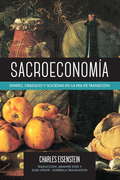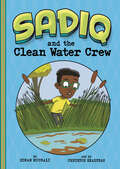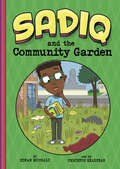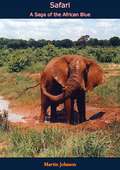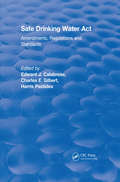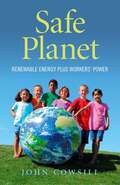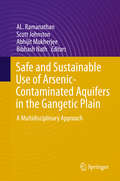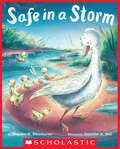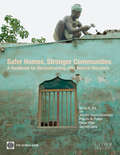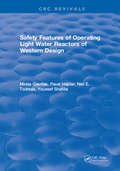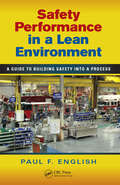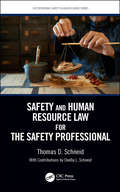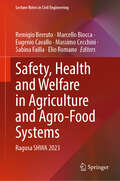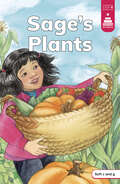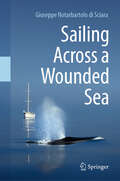- Table View
- List View
Sacroeconomía
by Charles Eisenstein Susa Oñate Arianne SvedSacroeconomía analiza la historia del dinero desde las antiguas economías del obsequio hasta el capitalismo moderno, revelando hasta qué punto el sistema monetario ha contribuido a la alienación, la competencia y la escasez, ha destruido el sentimiento de comunidad y ha obligado al crecimiento ilimitado. Estas tendencias han llegado a su extremo hoy en día. Sin embargo, tras su derrumbe podríamos hallar una gran oportunidad para acometer la transición hacia un modo de ser más interconectado, ecológico y sostenible. Este libro trata de la transformación que deberá experimentar --y que ya experimenta-- el sistema monetario para encarnar dicha transición. Sacroeconomía ofrece una síntesis amplia que integra teoría, políticas y prácticas, y examina conceptos vanguardistas de la Nueva Economía, entre ellos la moneda de interés negativo, la moneda local, la economía basada en los recursos, las economías del obsequio y la restauración del procomún. El autor, Charles Eisenstein, sopesa también las dimensiones personales de esta transición, dirigiéndose a quienes aspiran a un "modo de subsistencia correcto" y a vivir en consonancia con sus ideales en un mundo aparentemente gobernado por el dinero. Recurriendo a una larga tradición de pensamiento económico convencional y no convencional, Sacroeconomía presenta una visión original a la vez que sensata, radical a la vez que moderada; una visión de creciente relevancia ante la crisis, cada vez más profunda, de nuestra civilización.
Sadie's Seed Adventures: Learning About Seeds
by Tina DybvikSadie and Gardener Marv set out to clear weeds from a garden plot. While working, they go on a magical adventure to learn all about seeds. From hitching a ride with a cocklebur to flying through the sky with a milkweed seed, join Sadie as she figures out how seeds disperse.
Sadiq and the Clean Water Crew (Sadiq)
by Siman NuuraliMs. Battersby’s class is heading to the pond for a field trip. They hope to see birds, bugs, fish, and turtles! But one thing Sadiq sees makes him worried—dead fish! What happened to them? This question leads Sadiq on a mission to solve the mystery. When he discovers that the problem is likely polluted water, Sadiq and his friends form the Clean Water Crew! But what can kids do to help clean up bodies of water? Join Sadiq’s Clean Water Crew to find out!
Sadiq and the Community Garden (Sadiq)
by Siman NuuraliOn the way to the library, Sadiq and his family pass an empty lot in their neighborhood. It looks like it could use some attention. Sadiq and his brothers and sisters come up with ideas for what the lot could be. A playground? A skatepark? Then a science unit about plants at school gives Sadiq and Hooyo another idea—a community garden! But where to begin? And how to get people involved? It’s up to Sadiq and his classmates to “dig in” and make the community garden a success!
Safari Journal: The Adventures in Africa of Carey Monroe
by Hudson TalbottTwelve-year-old Carey Monroe has no idea what he's in for when his wacky aunt Elaine drags him along on an African safari. Soon after arriving in Kenya, Carey meets a Maasai man and his son, who open Carey's eyes to the ways of their people and the beauty of the African landscape and wildlife. Their adventures turn suspenseful when they encounter an international poaching ring that trades illegally in rhino horns and elephant tusks. Explore the world of the Maasai people at Carey's side by reading his journal, filled with his vivid accounts, photographs, and illustrations. Hudson Talbott has created an exciting, informative safari story that will fascinate readers of all ages. An author's note provides cultural context for Carey's adventures.
Safari: A Saga of the African Blue
by Martin JohnsonAnother captivating book by the American adventurer and documentary filmmaker, Martin Johnson, with 66 illustrations.
Safe Crossing
by Kari PercivalHow does an amphibian cross the road? With the help of the Amphibian Migration Team! Learn all about a citizen scientist who acts as a crossing guard for migrating amphibians and helps build them a tunnel to safety in this delightful nonfiction picture book!From Kari Percival, Ezra Jack Keats Award-winning author of How to Say Hello to a Worm, comes an entertaining and informative children’s book perfect for curious, nature-loving young readers.Every spring, frogs and salamanders must travel from wooded uplands where they were born to vernal pools where they will mate. Unfortunately, roads constructed through their habitats have made the journey dangerous for these slow-moving animals. Many never reach their destinations. But with the help of the Amphibian Migration Team, there is hope for a safe crossing!Readers will learn so much about amphibians and their habitats and get a great introduction to civic participation, too. The citizen scientist at the heart of this story presents her proposal for a wildlife tunnel to her local City Council and coordinates with stakeholders in the process like a wildlife biologist, a herpetologist, a roadway engineer, a surveyor, the Conservation Commission, the Department of Fish and Wildlife, the Department of Transportation, contractors, and reporters. It’s a fascinating way to find out how local government works and how kids can actively create social change. Playful and educational, Safe Crossing offers an empowering example of how even the youngest citizens can raise awareness about a meaningful cause, drive change, and unite people locally and globally.BECOME A CITIZEN SCIENTIST: Citizen scientists are rallying around the world. You, too, can train to be an amphibian crossing guard! Protecting amphibians as they migrate to and from laying eggs means protecting many endangered species.CONNECTION AND CONSERVATION: Doing citizen science gives kids and caregivers a meaningful way to connect with neighbors, friends, and their local ecosystem. This book offers a powerful example of how children can make a difference by raising awareness and uniting a community around causes they care about.FASCINATING BACKMATTER: There’s so much to learn! Additional resources at the back of the book include information on amphibian life cycles, crossings, and safety, wildlife tunnels, road safety, becoming a community scientist, and a glossary. As an added bonus, the front and back endpapers feature scavenger hunts for spring peeper tadpoles, spotted salamander eggs, tiny fairy shrimp, and much more!Perfect for:Kids who love science, nature, and animalsTeachers, educators, and librarians seeking classroom books with STEM contentScout troop leaders and parents looking for engaging nature books for kidsEnvironmental activists and club leadersFans of Over and Under the Pond, We Are All Connected: Caring for Each Other & the Earth, and National Geographic Kids books
Safe Drinking Water Act (CRC Press Revivals)
by Edward J. CalabreseThis new book covers drinking water regulations such as disinfectant by-products, synthetic organics, inorganic chemicals, microbiological contaminants, volatile organic chemicals, radionuclides, fluoride, toxicological approaches to setting new national drinking water regulations, and trihalomethanes. In addition, organic and inorganic compounds scheduled to be regulated in 1989 and new candidates for the 1990s regulations are detailed.
Safe Harbor
by Padma VenkatramanAn uplifting novel in verse about an immigrant girl adjusting to life in the US through her love of nature, music, and poetry, by the award-winning author of The Bridge HomeWhen Geetha and her mom move from India to Rhode Island after her parents&’ divorce, they leave everything Geetha loves behind—her family, her friends, her dog, and all that&’s familiar. As if that&’s not hard enough, Geetha is bullied at her new school for her clothes, her food, and her English (who knew so many English words could be spelled or pronounced differently in the US—or just be altogether different!). She finds some solace in playing her flute and writing poetry, and even more when she meets Miguel, a kid with whom she has a lot in common, and the two of them help rescue an injured harp seal stranded on the beach. But Geetha can feel her anger building over lots of things—careless people who pollute the sea and hurt animals, and her mom for making her move. She&’s never been so sad and angry. She can see a lot of her fears mirrored in the injured seal when she visits it at the Marine Mammal Rehabilitation Center, and this broadens her understanding of survival skills. And when she and Miguel start a beach-clean-up venture, she&’s surprised to find how many kind kids are out there. Geetha is torn as the time comes to let the seal go, knowing she&’ll miss him, but wanting the best for him. She&’s learning to live with mixed feelings and accept that while there will always be rough waters, there are plenty of safe harbors too.
Safe Planet: Renewable Energy plus Workers' Power
by John CowsillWhat is the greatest challenge facing humanity this century? The answer is, how we can produce the energy and resources we need without endangering the future of human life on the planet. And yet, there aren&’t many books which present technical and political strategies for a rapid progress towards a safe planet – one powered by clean renewable energy alone. This is a real pity because many intelligent people would love to read a book on this subject. SAFE PLANET is the first book to describe a road-map towards a new world, a safe planet. It combines meteorological data and existing tried and tested technologies and it tackles the sticky problem of the existing global political and economic power structures. This optimistic book is a rallying cry for all those concerned about what the future holds for their children. If you are worried about your energy bills and the price of fuel, about the prospect of 'the lights going out', if you want to stop the environmental pollution and the alarming rate of species extinction, if you are against fracking, if you are for a cleaner better transport and energy infrastructure, if you are sick of the rich getting ever richer at the expense of the rest of us, this compelling and clear narrative about the crisis and its solution is for you.
Safe and Sustainable Use of Arsenic-Contaminated Aquifers in the Gangetic Plain
by Scott Johnston Al Ramanathan Abhijit Mukherjee Bibhash NathThis book offers a meaningful and practicable guide to better management of arsenic problems in the groundwater of the Gangetic Plain. It gathers contributions from distinguished researchers who have been actively working in the area for over a decade. The arsenic contamination of groundwater is a growing concern in the central Gangetic Plain, where the local population's main sources of fresh water are surface water, groundwater and rain water; of these sources, only the last two generally meet the most important criteria for drinking water in their natural state. Natural geological changes are presumed to be the primary reason for arsenic contamination in this region. Further, most of the people living in this area have developed the habit of drinking water (groundwater) from the arsenic-contaminated tubewells in many parts of the region. As a result, many are suffering from arsenicosis and many more are at risk. Since the cause of arsenic contamination in groundwater still remains unclear, this book seeks to address the arsenic issue in this region by pursuing a holistic and systematic scientific approach. Accordingly, it delineates various sources, processes, hypotheses and remedial approaches that are needed to manage the arsenic contamination in the Central Gangetic Plain.
Safe as Houses
by Eric WaltersThe date is October 15, 1954. Thirteen-year-old Elizabeth, who lives in the Toronto suburb of Weston, is a typical grade 8 girl. She has a secret crush on a boy in her class and she thinks Elvis Presley is "dreamy." Elizabeth also has a part-time job babysitting an adorable little grade 2 girl named Suzie, and Suzie's not-so-adorable grade 6 brother, David. Elizabeth's job is to walk Suzie and David home after school and then stay at their house with them until their mother gets home from work. David resents Elizabeth because he thinks he is too old for a babysitter, and he goes out of his way to make life miserable for her. On this particular evening, however, Elizabeth has more than a badly behaved boy to contend with. It is on this October night that Hurricane Hazel roars down on Toronto, bringing torrential rains that cause extensive flooding. David and Suzie's house is on Raymore Drive, a street that will be practically wiped out by the floodwaters. David and Suzie's parents are unable to reach the house, which means the children's safety on this most deadly of nights is Elizabeth's responsibility. She finds herself increasingly isolated. They are surrounded by rising water. The electricity goes out. The phone goes dead. Still, Elizabeth is sure they will be safe as long as they remain in the house. But are Elizabeth and the children really as "safe as houses"? Before this terrifying night is over, Elizabeth and David will have to learn to communicate and cooperate if they are to save their own lives and Suzie's. Their survival in the midst of one of Canada's worst disasters will depend upon their resourcefulness, maturity and courage.
Safe in a Storm
by Stephen R. SwinburneA comforting and reassuring love story!"When the clouds grow darker and the rain pelts and stings,I'm here, my little duck. Keep warm beside my wings."In this comforting read-aloud story, all the animals find cozy places to keep them safe and warm, no matter how loud the storm rumbles or how dark the night gets. Next to their mothers, the baby animals are able to let go of their fears and fall asleep despite the storm.Safe in a Storm is a fun, imaginative good-night story featuring loving animal characters. It'll comfort young children during scary storms and always.
Safer Homes, Stronger Communities: A Handbook for Reconstructing After Natural Disasters
by Priscilla M. Phelps Daniel Pittet Stephen Sena Jennifer Duyne Barenstein Abhas K. JhaBest practices in post-disaster housing and community reconstruction are constantly evolving. The frequency and severity of disasters are increasing and technology is changing how reconstruction is done. Reconstruction projects must increasingly focus on the need to reduce future risks by ensuring that what is rebuilt is safer and more disaster-resilient than what was there before. The expanding role of communities in managing community reconstruction, with financial and technical assistance from government, is another way reconstruction is changing. 'Safer Homes, Stronger Communities' is a handbook that gives policy makers and project managers the information they need to plan and carry out housing and community reconstruction projects that empower communities affected by disasters and that reduce their vulnerability to future disasters. The handbook includes nearly 100 case studies collected from global experts with recent experience in housing reconstruction that illustrate how the policies and practical approaches recommended in the handbook have been used on the ground. It also includes links to extensive technical information on the topics covered by the handbook and is complemented by a Web site for practitioners in the field (http://www.housingreconstruction.org). Designed to provide immediate guidance in post-disaster reconstruction settings, 'Safer Homes, Stronger Communities' is a vital resource for policy makers and project managers, and for all practitioners involved in post-disaster housing and community reconstruction and disaster risk management.
Safety Features of Operating Light Water Reactors of Western Design
by M. GavrilasThis text arose from a study originally undertaken for the Department of Energy to characterize the principal safety features of light water reactors of western design. This text should be of use to professional engineers interested in safety assessment of operating light water reactors, students interested in the principal safety features of LWRs, and others interested in tracing the design evolution of light water reactors. However, while ambitious in its scope, this text should not be viewed as presenting the levels of reactor safety of the various families of western reactor designs.
Safety Law: Legal Aspects in Occupational Safety and Health (Occupational Safety & Health Guide Series)
by Thomas D. SchneidSafety professionals must prepare every day to safeguard their employees in the workplace. Additionally, part of every safety professional’s responsibility is to safeguard their organization when a compliance inspection is conducted by federal, OSHA, or a state plan agency. Safety professionals are most organizations’ onsite safety and health "expert" and should be prepared far in advance of an inspection. They should be prepared during the inspection, and ready to defend the organization after the inspection. With the increase in the monetary penalties, the impact on an organization as a result of identified violations can be substantial. <P><P>This text prepares and educates safety professionals to address every phase from strategies, to compliance, to defenses, and provides a one stop location for information to address and prepare the safety professional if/when OSHA knocks at the door. Additionally, the safety function does not work in a vacuum. Other potential risks and potential liabilities from other laws, such as the ADA, which can impact the safety function, are also addressed. Safety professionals know that their organizations depend on their experience and expertise in their decision-making process. <li>Provides a legal prospective to prepare safety professionals for OSHA inspection and related potential risks <li>Case studies to enhance learning and state-by-state listing of applicable laws and regulations <li>Demonstrates an understanding of defense preparation and strategies for safety professionals <li>The safety professional’s "go to" book for compliance and inspections
Safety Performance in a Lean Environment: A Guide to Building Safety into a Process (Occupational Safety & Health Guide Series)
by Paul F. EnglishAs changing customer demands and shifting world markets continue to put a strain on businesses in all sectors, your business needs every advantage to stay competitive. Many people may think of Lean processes as suitable only for the manufacturing floor, but that couldn't be further from the truth. Safety Performance in a Lean Environment: A Guide t
Safety and Human Resource Law for the Safety Professional (Occupational Safety & Health Guide Series)
by Thomas SchneidThe purpose of this text to provide a "one stop" source for safety professionals to acquire a general knowledge regarding not only the OSH Act but also laws and standards which impact the safety profession on a daily basis. The safety professional today does not work in a vacuum and decision-making can be impacted by a myriad of other laws. This new book will be the safety professional’s "go to" text to acquire a quick understanding of the particular law potentially impacting his/her daily activities. <p><p>Features <li>Includes safety laws as well as human resource laws <li>Presents new OSHA whistleblower actions <li>Encompasses updated contractor requirement under Wage and Hour laws <li>Covers new NLRA decisions and actions <li>Addresses e-commerce and social media issues involving the safety function
Safety, Health and Welfare in Agriculture and Agro-Food Systems: Ragusa SHWA 2023 (Lecture Notes in Civil Engineering #521)
by Marcello Biocca Eugenio Cavallo Massimo Cecchini Sabina Failla Elio Romano Remigio BerrutoThis book gathers the latest advances, innovations, and applications in the fields of agricultural biotechnology, agro-food systems and forestry, as presented by leading international researchers and engineers at the 7th International Conference on Safety, Health and Welfare in Agriculture and Agro-food Systems (SHWA), held in Ragusa, Italy, on September 6–9, 2023. The papers cover a range of topics such as agricultural assistive technologies, machine milking, animal welfare, sustainable livestock farming, work organization and logistic in agro-food supply chain, agricultural instrumentation and equipment, safety and health in building, agriculture 4.0, automation, occupational health, precision farming, effect of landscapes on human health, environmental safety, rural health, agricultural machinery, ROPS, augmented reality and IoT, cyber security. The contributions included in the book were selected by means of a rigorous peer-review process and offer an extensive and multidisciplinary overview of interesting solutions in the field of sustainable agriculture.
Sage's Plants (Stairway Decodables Step 4)
by Leanna KochSage's garden is full of beautiful plants to look at--and delicious vegetables to eat! Stairway Decodables is a supplemental phonics resource that’s perfect for supporting small group instruction, independent reading, or reading practice at home. This title provides practice in decoding words with soft c and g.
Sailing Across a Wounded Sea
by Giuseppe Notarbartolo di SciaraThe capacity of humans to destroy their environment is playing out like a Greek tragedy in the Mediterranean Sea. After having coexisted with a diversity of marine animals throughout their history, humans have broken the balance in recent decades, and the survival of countless marine creatures is now increasingly uncertain. However, unlike in classical tragedies, real-life entities are not necessarily doomed by their fate, and there must be hope to turn the tide in nature’s favour. Lack of concrete conservation action might be simply due to a lack of awareness: how can we feel sad about a loss if we don’t know what we are losing? “Sailing Across a Wounded Sea” is the story of an ideal journey around the Mediterranean to meet its non-human inhabitants, consisting of real episodes collected over half a century as the author observed real animals, exchanged views with a variety of contacts, and argued for such views in the policy arena. Encountering whales, dolphins,seals and rays in their habitat and on their terms will hopefully contribute to building up in readers a collective commitment to help secure a future for these species. A future where they are allowed to flourish as they were meant to - had humans never trod so heavily on the sea’s delicate ecological balance and the interwoven natural processes. Giuseppe Notarbartolo di Sciara has been involved for a lifetime in protecting marine biodiversity in various capacities – as a scientist, civil servant, advocate and sailor. Having studied in California and worked with whales, dolphins and sharks worldwide, he returned to the Mediterranean in 1985, keen on using his acquired tools to discover more about the ancient sea's natural history. Here, he described small but vibrant populations of fin and sperm whales, along with various species of dolphins, manta rays and the monk seal. At the same time, seeing the Mediterranean’s progressive degradation at the hands of humans, he felt a surge of rebellion against this squandering of natural values, and wished to raise awareness of the existence of these marine natural treasures and the risk of losing them. “Drawing from decades of first-hand experiences, in ‘Sailing Across a Wounded Sea’ Giuseppe Notarbartolo di Sciara offers a compelling narrative that interweaves the beauty of the Mediterranean Sea’s non-human inhabitants with the challenges they face due to human activity. As he reflects on his journey, the author underscores the imperative for collective action and the need for heightened awareness and proactive conservation measures to protect our oceans. ‘Sailing Across a Wounded Sea’ serves not only as a captivating voyage but also as a sobering call to responsibility. Join Giuseppe Notarbartolo di Sciara on this insightful expedition and discover the profound significance of preserving our marine ecosystems for future generations.” —Peter Thomson, United Nations Secretary General’s Special Envoy for the Ocean “The Mediterranean, the cradle of civilisation, is a sea steeped in history. From Apollon and Artemis to Pythagoras and Hercules, names in this book summon up images of civilisations past and lost. The greatest Greek philosopher of them all, Aristotle, is also regarded as the father of marine biodiversity, stemming from his research conducted on Lesbos Island. And yet this ancient world, familiar to so many, is under threat. In this book Notarbartolo di Sciara takes us on a modern-day odyssey through these waters, based on over 50 years of personal observations. He reminds us of the impact of the progressive footprint of human action and endeavour, which has spread out across the whole sea, changing, and depleting its beauty and splendour. His voyage paints a picture not just of what is at stake but also of the potential the future can hold if we all work together to give nature a breathing space, to allow it to restore and recover. In our modern world, where we h
Sailing Acts: Following An Ancient Voyage
by Linford StutzmanFor those who love sailing and you-are-there travel literature. Also for those who enjoy studying the life and times of the Apostle Paul. But definitely for those who love adventure, or at least reading about it! Seafaring isn't for the faint of heart. It wasn't for the Apostle Paul in the first century A.D.-shipwrecked, imprisoned, and often a stranger in foreign lands. And it turned out to be a heart-stopping task some two thousand years later, when a religion professor and his wife undertook a 14-month journey by sailboat! They stopped in eight countries, visiting every site where Paul stopped on his tumultuous missionary journeys. "Sailing Acts" traces this 21st-century voyage from Volos, Greece, to Rome, Italy, by car, by foot, by motorized scooter, but mostly on a 33-foot boat, logging more than 3600 nautical miles over two sailing seasons. "Explorers are easy to admire or despise, but very difficult to understand without going on the trip," writes Stutzman. "To really appreciate the experiences, the drama, and development of Paul the explorer, you need to sail with him." So begins Sailing Acts, inviting readers to come on board. Stutzman draws thoughtful comparisons from his own travel mishaps and adventures to the ones Paul experienced on his journeys. This book is in the tradition of Bruce Feiler's Walking the Bible. Stutzman's knowledge of the socio-political setting in the first-century Roman empire provides an informative backdrop to understanding Paul and reading his epistles in a new light. The book includes dozens of photos, maps showing the couple's travel routes, a list of all the repairs and replacements Stutzman made to the aging boat which he bought sight-unseen, and an itinerary of places they visited.Skyhorse Publishing, as well as our Sports Publishing imprint, is proud to publish a broad range of books for readers interested in sports-books about baseball, pro football, college football, pro and college basketball, hockey, or soccer, we have a book about your sport or your team.In addition to books on popular team sports, we also publish books for a wide variety of athletes and sports enthusiasts, including books on running, cycling, horseback riding, swimming, tennis, martial arts, golf, camping, hiking, aviation, boating, and so much more. While not every title we publish becomes a New York Times bestseller or a national bestseller, we are committed to publishing books on subjects that are sometimes overlooked by other publishers and to authors whose work might not otherwise find a home.
Sailing Alone around the World
by Joshua Slocum William GilkersonFull of astounding adventures, Sailing Alone around the World is the true story of the first man ever to circle the globe alone entirely by sea. In a little over three years, Captain Joshua Slocum completed the feat many experts believed couldn't be done--and he has the stories to prove it. During his historic voyage, Slocum was chased by pirates in Gibraltar, soaked by a "rain of blood" in Australia, and battered by perilous storms in the open ocean. He also met many famous--and infamous--people along the way, from Mrs. Robert Louis Stevenson in Samoa, to Black Pedro, "the worst murderer in Tierra del Fuego." This absorbing tale, written with humor and poetic eloquence, was first published in 1900 and has remained in print ever since.
Sailing Escape to Guam
by Bill BeckerSailing ESCAPE to Guam, is a story about a fictitious family of five in a sailboat named "ESCAPE" from California to Guam. They stopped at Hawaii, Marshall Islands, Ponape along the way. They were headed for Guam, when dramatic things happen to the family. Brian, the husband, father and captain is rendered comatose by an accident, some 300 miles east of Guam. His wife, Sharon, who was proficient in domestic duties, didn't have a clue about sailing the boat. Alan, the oldest son, to whom the captaincy of ESCAPE should have fallen, was possessed with a changing hormone mix that interfered with his rational thinking. Steve, the twelve-year-old son and his eleven-year-old sister, Kelly, were determined to sail the boat to a harbor in Guam or at least close enough to land to get help for their ailing father. A maturing process takes place as the children meet each of the challenges presented to them. Though they endured many hardships and surprises, the two young children remained determined to succeed.
